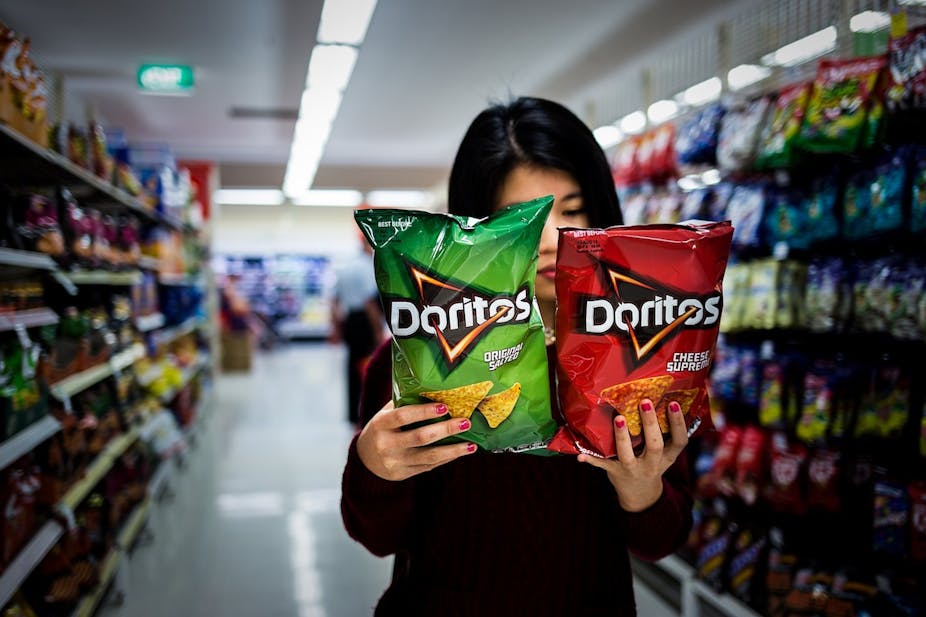The days when Coles and Woolworths only sold groceries are long gone. Both are now established players in a broad range of consumer markets, with interests in liquor and hotels, fuel and convenience, general merchandise and mobile phones. With a network of over 1,600 supermarkets, 1,100 service stations, 2,200 liquor stores and nearly 400 hotels, the supermarket duo are now getting ready for a war with Australia’s big four banks.
Dubbed the “clash of the titans” by the ABC’s 7.30 program, Coles and Woolworths are said to have entered high-level talks to create their very own banks. In September 2013, Coles took the first steps towards providing financial products to the Australian market when it applied for the necessary licences.
In late June 2014, Woolworths registered the trademark Woolworths Money with the Australian Trade Marks Office. While the new trademark enables Woolworths to centralise its financial offerings, such as insurances and credit cards, it may signpost a desire to expand into deposit taking, personal loans, residential mortgages and even superannuation and retirement funds. It appears Coles is following suit and it has registered the trademarks Coles Money and Coles Financial.
The two supermarkets have dipped their toes into the banking pool in the past, offering credit cards and insurance policies, while just last month Coles announced it was moving into the personal loan market with GE Capital.
But this latest venture has the potential to change the way banks do business. Rather than using standard measures of risk, Coles and Woolworths will be relying on your shopping habits to give them that competitive edge over the other banks.

An appetite for data
Following in the footsteps of the British supermarket retailer Tesco, Coles and Woolworths plan to use shopper data — such as where a customer buys fuel to detect how far they drive — to tailor and develop their financial products. 14.5 million Australians use FlyBuys and Woolworths Rewards loyalty cards, gathering a treasure-trove of data on consumer habits, budgets and lifestyles. Combine this with data from partners like Telstra, Qantas, WebJet and Medibank, it becomes pretty clear that Coles and Woolworths will have an advantage.
In a recording obtained by the ABC, Woolworths Director of Group Retail Services, Penny Winn, explained how the company might use this consumer data to assess financial risk.
Customers who drink lots of milk and eat lots of red meat are very, very, very good car insurance risks versus those who eat lots of pasta and rice, fill up their petrol at night, and drink spirits. What that means is we’re able to tailor an insurance offer that targets those really good insurance risk customers and give them a good deal.
At the other end of the spectrum they will also avoid those customers engaged in risky behaviours, such as people buying a lot of medicines and vitamins to reduce high blood pressure or high cholesterol – or these new banks could charge a higher premium for car insurance to people who purchase performance car magazines. The possibilities are endless.
Risky business
Graeme Samuel, former chairman of the Australian Competition and Consumer Commission (ACCC), believes that ready access to consumer data could be just what is needed to shake things up among the big four banks and force cheaper products overall.
One of the masterminds behind Tesco Bank in the 1990s is Andrew Higginson, and he says Tesco’s database of shopper information proved invaluable in developing finance products.
Simple examples would be, say, if you had a group of customers who tended to buy their fuel from Tesco in the same place every time, you could deduce that those customers might only travel short distances in their local neighbourhood. In a car insurance sense, that’s a lot safer. There’s a lower risk of accidents than someone who might be driving thousands of miles up and down the country every year.
Samuel also points out online giants such as Google, Facebook, and Amazon are already using data to profile consumers and it’s simply the way people now do business.
Yet some privacy activists have raised questions about the legality of such practises.
Flybuyer beware
Independent consumer group Choice says customers of both supermarkets may not be aware of how much information they are giving away. An evaluation by Choice of the various rewards programs available found most of these programs offer such poor rewards that you generally save less than a dollar per $100 spent.
In return the supermarkets gain access to a well of information, including whether you’re a smoker, prefer organic produce or buy low-fat margarine. We have no doubt this looming combination of shopping, financial and insurance data will give Coles and Woolworths unmatched power to segment markets, tailor offers and mitigate their risks.
The supermarkets will claim the use of “big data” will inevitably lead to lower costs for safer drivers and financially responsible consumers, and this is a good thing. But we wonder if customers will continue to part with their information so freely if they become more aware of the impact it has on other parts of their lives, such as the cost of their insurance or home loan.

